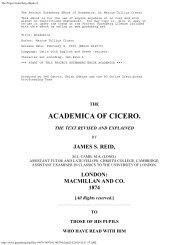From Farm House to the White House - 912 Freedom Library
From Farm House to the White House - 912 Freedom Library
From Farm House to the White House - 912 Freedom Library
You also want an ePaper? Increase the reach of your titles
YUMPU automatically turns print PDFs into web optimized ePapers that Google loves.
<strong>Farm</strong> <strong>House</strong> <strong>to</strong> <strong>the</strong> <strong>White</strong> <strong>House</strong>, by William M. Thayer 145<br />
"No more?" exclaimed Reed. "You surprise me!"<br />
"You cannot be more surprised than I am. It is a fearful condition for this army <strong>to</strong> be in."<br />
"How can it be so?" added Reed, still more surprised. "According <strong>to</strong> that, powder is scarcer than clothing."<br />
"It is true, if my investigation does not mislead," responded Washing<strong>to</strong>n. "No army was ever in a condition so<br />
deplorable; and I would not dare <strong>to</strong> let my soldiers know <strong>the</strong> actual state of things, lest <strong>the</strong>y become<br />
demoralized."<br />
"Fortunate for us that so far <strong>the</strong>y are in blissful ignorance of our condition," said Reed; "but this state of<br />
affairs must not be suffered <strong>to</strong> continue."<br />
"Certainly not; I shall take immediate measures <strong>to</strong> remedy <strong>the</strong> evil."<br />
And he did. Agents were sent in different directions <strong>to</strong> procure ammunition. A vessel was sent <strong>to</strong> <strong>the</strong><br />
Bermudas for this purpose. Expeditions <strong>to</strong> capture British forts in this country and Canada were set on foot.<br />
The manufacture of powder was recommended by Congress.<br />
At that time, <strong>the</strong> transportation of supplies for an army was a slow and tedious work. There were no railroads,<br />
and <strong>the</strong> facilities for transportation by horses and cattle were far inferior <strong>to</strong> those of <strong>the</strong> present day. For<br />
example, a little later, Henry Knox, who was a thriving book-seller in Bos<strong>to</strong>n when <strong>the</strong> British <strong>to</strong>ok<br />
possession of <strong>the</strong> city, and who fought bravely at Bunker Hill, was sent <strong>to</strong> Ticonderoga and Crown Point,<br />
which <strong>the</strong> Americans had captured, <strong>to</strong> bring such artillery and ordnance s<strong>to</strong>res as could be spared. He was<br />
instructed, also, <strong>to</strong> proceed <strong>to</strong> St. John and Montreal, both of which had just been captured by American<br />
expeditions under Benedict Arnold and Ethan Allen, Generals Schuyler and Montgomery. It was in <strong>the</strong> depth<br />
of winter when Knox returned with over fifty cannon, mortars, and howitzers, and a quantity of lead and<br />
flints, loaded upon forty sleds, drawn by eighty yoke of cattle. Washing<strong>to</strong>n procured for Knox <strong>the</strong> commission<br />
of colonel soon after he under<strong>to</strong>ok <strong>the</strong> enterprise.<br />
Washing<strong>to</strong>n's headquarters were established at <strong>the</strong> CRAGIE HOUSE, a spacious building, favorably situated<br />
for <strong>the</strong> commander-in-chief. For many years it was owned by Professor Longfellow <strong>the</strong> poet, who died <strong>the</strong>re<br />
some years since.<br />
Order, sobriety, and religion regulated his headquarters. Morning and evening prayers were scrupulously<br />
maintained, and <strong>the</strong> whole appearance of <strong>the</strong> place indicated that <strong>the</strong> renowned occupant was a Christian.<br />
Washing<strong>to</strong>n required <strong>the</strong> chaplains of all his regiments <strong>to</strong> conduct prayers morning and evening, and religious<br />
services on <strong>the</strong> Sabbath. The officers were required <strong>to</strong> see that <strong>the</strong>ir men attended all <strong>the</strong>se services, since <strong>the</strong>y<br />
were observed "for <strong>the</strong>ir good."<br />
Early in <strong>the</strong> siege of Bos<strong>to</strong>n, when he felt that "if success ever crowns <strong>the</strong> American cause, it will be because<br />
an All-wise Providence controls <strong>the</strong> affairs of men," Washing<strong>to</strong>n advised <strong>the</strong> appointment of a day of fasting<br />
and prayer, <strong>to</strong> intercede for <strong>the</strong> blessing of God upon <strong>the</strong> little army at Cambridge. Congress appointed <strong>the</strong><br />
day, and <strong>the</strong> commander-in-chief required its observance throughout <strong>the</strong> army. Religious services were held,<br />
all business suspended, and <strong>the</strong> day was made as quiet and religious as Sunday.<br />
One of <strong>the</strong> earliest arrivals at <strong>the</strong> camp in Cambridge, after Washing<strong>to</strong>n <strong>to</strong>ok command, was from Virginia,<br />
Pennsylvania, and Maryland, fourteen hundred sharp-shooters, as we should call <strong>the</strong>m now. They were tall,<br />
stalwart men, dressed in fringed hunting shirts and round caps. They were received in camp with <strong>the</strong> wildest<br />
demonstrations of joy. A few weeks later a long, lumbering train of wagons, laden with military s<strong>to</strong>res<br />
captured on <strong>the</strong> sea, came in<strong>to</strong> camp. Washing<strong>to</strong>n had been forced <strong>to</strong> send out cruisers, by <strong>the</strong> action of















